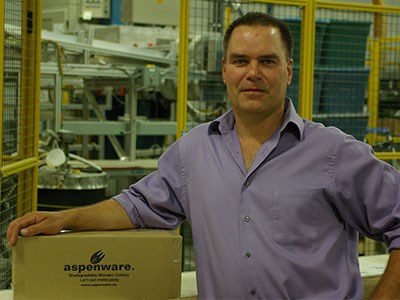A British Columbia entrepreneur, who makes award-winning compostable wooden cutlery, said he wants to expand his presence in northwestern Ontario.
Aspenware president Terry Bigsby sources poplar veneer from a First Nation-owned sawmill near Ear Falls and is looking to cultivate more Aboriginal fibre-based partnerships in the Western provinces and Ontario as his Okanagan Valley company continues to grow.
He’s still rekindling the idea of a factory in Northern Ontario to tap into the U.S. Midwest and southern Ontario markets, a concept he first proposed for the Dryden area in 2010.
“I wouldn’t start everybody’s wheels going if that didn’t have some merit.”
Bigsby said if they intend to push higher volumes of product into the U.S. Midwest and southern Ontario markets, shipping logistics dictate that they’ll need factories at both ends of the country.
“We know we gotta do something and building the product closer to the wood source is absolutely the most critical component to the whole thing.”
Aspenware utensils are sold throughout Canada and the U.S. to retail chains like Whole Foods, Pharmasave and Home Outfitters. The company is also making headway into Europe through a distributor there.
The product is marketed as an environmentally conscious consumer item. But it’s tough to convince major fast food chains to adopt wood cutlery when plastic cutlery is so much cheaper, said Bigsby.
“We’re an upper-end barbecue type of product that will eventually become a commodity type of product. But today, it’s a bit of niche market specialty.”
His first stab at trying to establish a manufacturing plant in the northwest wasn’t a memorable one.
Back in 2010, Bigsby’s original plan was to construct a factory in Dryden and put 150 people to work. The region’s forest economy was reeling when he arrived in the area two years prior to scope out a site with the encouragement of a provincial government official.
He wanted to attain a sustainable forest licence and contract out the harvesting to private and First Nation harvesters.
“You’re talking about employment, jobs and building the economy. Aspenware has one of the highest yields per cubic metre of fibre in a commercial product than any other product in the world.”
But the company wasn’t able to secure a Crown wood supply and a provincial loan guarantee application went nowhere.
“They screwed us,” Bigsby said. “The Ontario government basically promised the world and delivered nothing. They told us to go back to B.C., design and build our machine and prove it out.”
Bigsby and his team have been working since 1997 to perfect the laminated two-ply veneer product that’s bonded with an edible adhesive. He left his job as a high school industrial arts teacher in 2004 to focus on his startup company.
Their utensil, the patented commercial process and the equipment was deemed worthy enough to win them a Manning Innovation Award in the environmental category in 2012.
At their new 25,000-square-foot Vernon production facility, which opened in 2012, they pump out 15,000 and 20,000 knives, forks and soup spoons an hour and are about to expand shortly into a two-shift operation.
ATS Automation of Cambridge has been contracted to help design and build a second production line.
Bigsby said it’s actually cheaper to pull veneer from Ontario and rail it west to his factory than buying it from B.C. producers.
To keep costs down, he’d like to partner on a wood drying operation to eliminate a mould problem.
And there are some fibre access problems to be worked out, said Bigsby.
His veneer supplier, Doug Riffle, owner of Makoose Wood Innovations, has had issues harvesting in the Whiskey Jack Forest due to an historical dispute over harvesting in the Grassy Narrows First Nation territory, a matter that’s now before the Supreme Court of Canada.
But Bigsby said he’s willing to be patient and can source from other suppliers in the meantime until the case is resolved.
In recent months, he’s started discussions with Lac Seul First Nation, near Sioux Lookout, which offers a “great harvesting program.”
“The whole program takes time and effort on everybody’s part so we know that’s a challenge. In working with the First Nation groups, most people don’t want to go through that challenge. Well, I think that challenge has extreme value for everybody. For Doug’s group, for us, for the northwest, it just makes sense.”




